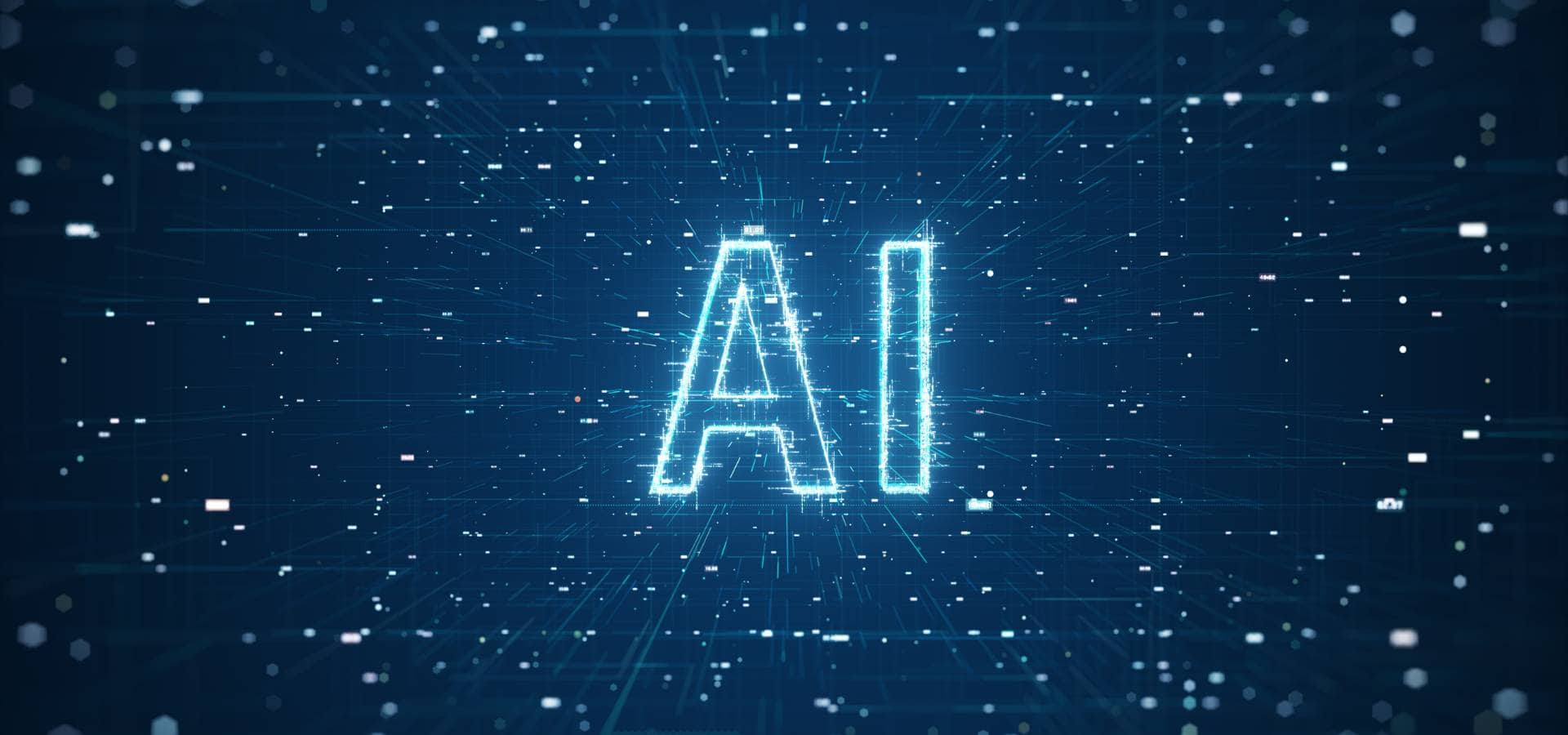Artificial intelligence is being applied in more and more industries. It is even said that it will replace many professions over time. At this stage, however, it is primarily a tool that can effectively support humans when performing repetitive tasks and analyzing large amounts of data. It is also great in the financial sector, serving as both front and back-office support. Find out how financial artificial intelligence works and improves your organization’s operations!
Table of Contents
- How does artificial intelligence work?
- Artificial intelligence in finance – what is it?
- AI in banking and finance – legal regulations
- Financial artificial intelligence – limitations
- The new dimension of communication – AI Banking by Ailleron
- FAQ
How does artificial intelligence work?
Before we move on and learn more about AI in banking, let’s look at how artificial intelligence works.
Artificial intelligence (AI) is a programme designed to replicate the workings of human intelligence, i.e., the ability to learn, analyze information, draw conclusions and make decisions based on that information. If it is to perform exactly the same tasks as a human, why do we need it at all? Well, unlike humans, AI can process huge amounts of data in a short time, and it shows no signs of fatigue. This allows us to avoid work interruptions and to receive broader responses limited only by the database provided to the program.
Artificial intelligence is primarily based on machine learning (ML), i.e., the artificial neural network “learning”. These networks, or in other words algorithms, imitate the structure of neurons (nerve cells) in the human brain. However, like the humans , they need the correct information to start working efficiently. So, how does machine learning work? There are three types:
- supervised learning – it is fully controlled by a human who provides the networks with some output data with corresponding names. The networks then correlate the two pieces of information and are then able to correctly identify objects and distinguish between them correctly;
- unsupervised learning – it takes place without human intervention. Algorithms independently review the provided data, group it and look for the distinguishing features of each group;
- reinforcement learning – neural networks are provided with specific rules and principles to apply. The next step is for them to attempt to solve particular tasks. If the algorithms give the correct answer, they receive a virtual reward, and if their answer is wrong, they receive a penalty. In this way, they can “understand” the rules of the different systems through trial and error.
So, as we can see, artificial intelligence behaves in a certain way like a human in its early years. It receives information and, based on this, tries to map how the world works. Depending on the needs, AI can be trained to perform various of tasks. All that is needed is to prepare the appropriate input data for it. However, it is crucial to remember that the learning process is not instantaneous, and quite a bit of time is always required. This time will vary depending on the task we want to adapt AI to and the amount of data we want it to work on. However, with such an investment, it will be possible to optimize operations later and reduce the involvement of human workers in a number of tasks. Fortunately, with such an investment, it will be possible to optimize operations later and reduce human workers’ involvement in several tasks.
Artificial intelligence in finance – what is it?
If we already know how artificial intelligence works and how it can be customized, let’s see what an AI bank might look like.
First, we distinguish between two areas of AI in banking and finance – the front and back offices. The front office includes all tasks in which an employee of an organization has direct contact with customers. On the other hand, the back office includes activities necessary for the organization’s proper functioning but without direct contact with customers.. Artificial intelligence can easily handle both areas.
AI for banks – front office
Every day, banks face increasing digital interactions with current and potential customers interested in the organization’s offers. Unsurprisingly, standard human customer service has long since ceased to cope – even a few hundred people in the country cannot cope with thousands of inquiries. This is why many new AI-based solutions have been introduced.
Chatbots
They can be found on almost every bank’s website – it is with them that customers begin to deal with their cases. In many cases, these programs solve problems themselves, and only when they cannot cope with them do they pass the task on to a customer service employee.
Chatbots are, of course, artificial intelligence. Thanks to an increasing number of customer interactions, they already have sufficiently complex knowledge to provide accurate answers to users’ most common questions. Artificial intelligence is also good at accepting complaints and handling them. However, that is not all. Indeed, AI is increasingly suggesting specific solutions to customers tailoring the bank’s offers based on an analysis of their past actions. This also saves much time for customer service staff. Moreover, it may result in a better outcome, as humans cannot analyze as much data as AI.

Robo-advisory
When it comes to tailoring solutions to the customers, it is worth noting robo-advisory in particular. This artificial intelligence takes on the role of an investment advisor. It operates based on the answers given by the user in a questionnaire especially prepared for this purpose. It includes questions about, among other things, the customer’s financial goals and the monthly amount that can be invested. The robo-advisor calculates the investment risk and presents a proposed investment portfolio based on such information. Using AI in investment advice not only allows the bank to be more efficient, because the customer does not have to wait for a free employee, but also guarantees that the most sensible option is selected because artificial intelligence does not consider emotions.
Biometrics
A unique type of front office activity undertaken by artificial intelligence in a bank is the analysis of biometric data. This type of data makes it possible to identify a specific person and thwart unauthorized access to other people’s personal data. For this purpose, AI needs a current photograph of the user (usually a selfie) and a photograph of an identity card. Based on these, it authenticates the customer, who can then even open a bank account or take out a loan without leaving home.
Artificial intelligence bank – back office
Artificial intelligence is equally widely used when analyzing processes inside a bank. We will look at the most important issues/cases connected with these.
Development of IRB models
It is difficult to imagine the work of any bank without the development of sophisticated internal IRB (Internal Ratings-Based Approach) models used to assess the extent of credit risk. This is a tool by which an organization can protect itself from losses caused by customer default. Artificial intelligence, which relates a specific level of risk to specific capital requirements and makes predictions of events, such as the risk of customer bankruptcy, is perfect for this task.
Robotic Process Automation
Artificial intelligence in banking can also help to perform repetitive processes within the bank. AI can, for example, analyze and classify incoming documentation and verify the correctness of completed documents and correspondence. Since these are relatively monotonous tasks and can lead to a loss of concentration in employees, using artificial intelligence is so beneficial in this case and can minimize errors.
Anti-fraud systems
AI works well as part of anti-fraud systems, i.e., tools for detecting criminal transactions, including money laundering and terrorist financing. In this case, it can reduce or completely eliminate the occurrence of false-positive and false-negative phenomena that occurs when using anti-fraud systems that do not rely on AI. False-positive involves wrongly classifying a transaction as suspicious, blocking the account, or stopping the trade. Conversely, false-negative is the recognition of a suspicious transaction as neutral so that criminals will not be stopped. Both negatively affect a bank’s reputation and, in the worst cases, can even lead to significant financial losses. Artificial intelligence significantly improves the operation of anti-fraud systems by more accurately classifying the nature of transactions considering the individual nature of the institution or company.

AI in banking and finance – legal regulations
While artificial intelligence is great for assisting the financial sector’s operations, it is crucial to bear in mind that there are risks involved in using this tool. First and foremost, AI is not infallible – just like the human beings it tries to emulate, it can make mistakes. Therefore, actions taken by AI should necessarily be supervised. Furthermore, the use of AI in banking involves the risk of compromising the security of customer data.
The European Union is already preparing a legal framework for AI from 2021 to ensure the safe creation and use of artificial intelligence. At the end of 2022, the draft AI Act, a European Parliament regulation, was published. Its aim is to:
- support the development of artificial intelligence along with providing a high level of security for companies and individuals;
- establish regulations that would limit the risks arising from the use of AI;
- harmonize the rules for marketing, make available and use artificial intelligence within the European Union.
This project also distinguishes between three main subtypes of AI:
- minimal risk – not requiring regulation, usually for private or internal use;
- low-risk – providers have to meet specific information transparency requirements, such as notifying that a conversation is being conducted with a chatbot;
- high-risk – privacy-invasive, e.g., AI carrying out identification through biometrics.
Undoubtedly, the introduction of appropriate legislation will allow safer use of the benefits of artificial intelligence and avoid unpleasant situations such as data leaks. However, it will still be some time before the relevant legislation comes into force.
Financial artificial intelligence – limitations
AI for banking is an excellent solution in many respects. It makes organizations much more efficient and takes many tedious responsibilities away from employees. However, it is vital to remember that AI is not free of drawbacks. As already mentioned, artificial intelligence makes mistakes. Most often, when it is faced with a new situation and has not yet developed an effective way of solving a problem. After all, it is impossible to predict all situations customers may encounter and prepare a system for them. The greater the use of AI, the greater its knowledge base becomes.
When using artificial intelligence, it is also important to remember that it is extremely susceptible to any suggestion. This is the other side of adapting AI to desired actions. As a result, neural networks can disseminate false information as truth.. Unlike humans, these systems do not have the capacity for self-reflection and the desire for fact-checking. They simply process the data given to them and can further disseminate it in an almost unaltered form. However, this does not mean that it is not worthwhile to use the help of artificial intelligence. It should just be done with your head.
The new dimension of communication – AI Banking by Ailleron
Effective AI banking is not just about robo-advisory, IRB modeling, or chatbots. It is also an opportunity to take customer communication to the next level. Due to the AI Banking module by Ailleron, you can monitor customer activity in various systems, predict their behavior patterns and, based on this, create specific target groups to which you can tailor your actions, such as marketing campaigns. You can also easily keep in touch with your customers via a chatbot, available around the clock, which is well-versed in your company’s operations.
We are well aware of the importance of matching the software to the nature of the organization. This is why we offer a range of solutions that can be applied to your bank. The most important among these are elements for analyzing and automating the processes taking place in your bank. Thanks to advanced analysis, you will learn what decisions are best for your company and your customers. With the help of automation, you will also speed up repetitive, simple tasks, contributing to more efficient customer service. Finally, you can significantly increase upselling and cross-selling opportunities.
At Ailleron, we focus on unique solutions, like AI Banking, Automatic Documents Processing and much more, that allow you to get the most out of your data and increase your bank’s capabilities. Many well-known bank brands from across Europe trusted us. They have increased their productivity and connected with their customers in a new way that was impossible before through a superior understanding of their needs and behaviors. Let us help your bank too, and create your digital wings!
FAQ:
- How does artificial intelligence in financial services work?
AI can be used in a bank in two areas – the front office and the back office. In the front office, it most often takes the form of chatbots or robo-advisors that allow human employees to be relieved of their duties. In the back office, it is usually process automation and participation in anti-fraud systems.
- Is it safe to use artificial intelligence?
Artificial intelligence always involves some risk. The European Union is developing a specific piece of legislation to regulate the use of AI. It is also advisable to use only systems from reliable providers.
- How can artificial intelligence help you interact with your bank’s customers?
With the help of AI, it is possible to accurately analyze a customer’s actions, based on which personalized offers, content and messages are created. This allows to increase both sales and customer satisfaction with services. Moreover, users can keep in touch with the bank due to an intelligent chatbot solving their problems.

 Polski
Polski
 Deutsch
Deutsch






